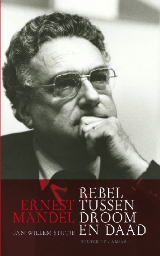
Ernest Mandel
Topics
Ernest Mandel
Quotations

Quotations
Ernest Mandel Trotskyist and leading member of the Fourth International, author of many works of social criticism and economic theory, a study of detective fiction, and magisterial introductions to the three volumes of Marx's Capital.
Sourced
From the Introduction to Capital vol. 1:- In fact, it would be very easy to ‘prove’ Marx’s analysis to have been wrong, if experience had shown, for example, that the more capitalist industry develops, the smaller and smaller the average factory becomes, the less it depends upon new technology, the more its capital is supplied by the workers themselves, the more workers become owners of their factories, the less the part of wages taken by consumer goods becomes (and the greater becomes the part of wages used for buying the workers’ own means of production). If, in addition, there had been decades without economic fluctuations and a full-scale disappearance of trade unions and employers’ associations (all flowing from the disappearance of contradictions between Capital and Labour, inasmuch as workers increasingly become the controllers of their own means and conditions of production), then one could indeed say that Capital was so much rubbish and had dismally failed to predict what would happen in the real capitalist world a century after its publication.
- Not only have material wealth and the possibilities for freeing mankind definitively from the burden of meaningless, repetitive and mechanical work increased, but so too has the polarization of society between fewer and fewer owners of capital and more and more workers of hand and brain, forced to sell their labour-power to these owners. The concentration of wealth and power in a small number of giant industrial and financial corporations has brought with it an increasingly universal struggle between Capital and Labour.
- For Marx, ‘pure’ economic theory, that is economic theory which abstracts from a specific social structure, is impossible.
- Capital, explaining the origins of the capitalist mode of production, points towards the inevitable historical decline and fall of this same social system. An economic theory based upon the historical relativity of every economic system, its strict limitation in time, tactlessly reminds Messrs the capitalists, their hangers-on and their apologists that capitalism itself is a product of history. It will perish in due course as it once was born. A new social form of economic organization will then take the place of the capitalist one: it will function according to other laws than those which govern the capitalist economy.
- By stating that the analysis of the laws of motion governing the capitalist mode of production necessarily includes at least some essential elements of an analysis of economic phenomena valid for the whole historical epoch encompassing economic organizations in which commodity production exists, one extends the validity of parts of Marx’s Capital not only into the past but also into the future.
- Precisely because Marx was convinced that the cause of the proletariat was of decisive importance for the whole future of mankind, he wanted to create for that cause not a flimsy platform of rhetorical invective or wishful thinking, but the rock-like foundation of scientific truth.
- When the dialectical method is applied to the study of economic problems, economic phenomena are not viewed separately from each other, by bits and pieces, but in their inner connection as an integrated totality, structured around, and by, a basic predominant mode of production. This totality is analysed in all its aspects and manifestations, as determined by certain given laws of motion, which relate also to its origins and its inevitable disappearance. These laws of motion of the given mode of production are discovered to be nothing but the unfolding of the inner contradictions of that structure, which define its very nature. The given economic structure is seen to be characterized at one and the same time by the unity of these contradictions and by their struggle, both of which determine the constant changes which it undergoes.
- Capitalism subordinates men to machines instead of using machines to liberate men from the burden of mechanical and repetitive work. it subordinates all social activities to the imperatives of an incessant drive for individual enrichment in terms of money, instead of gearing social life to the development of rich individualities and their social relations. The contradiction between use-value and exchange-value, inherent in every commodity, fully unfolds itself in this contradictory nature of capitalist machinery. When capitalism is not overthrown once it has created the material and social preconditions for a classless society of associated producers, this contradiction implies the possibility of a steadily increasing transformation of the forces of production into forces of destruction, in the most literal sense of the word: not only forces of destruction of wealth (crises and wars), of human wealth and human happiness, but also forces of destruction of life tout court.
Silverdale Interactive © 2026. All Rights Reserved.

